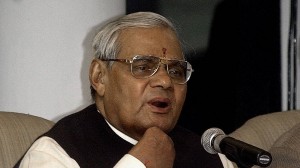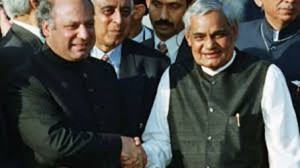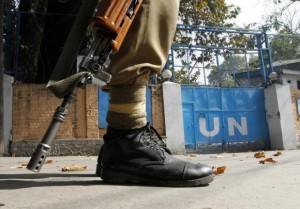Peace Watch » Editor's Take » Can Lahore Deceleration Be Starting Point for Dialogue on Kashmir?
Can Lahore Deceleration Be Starting Point for Dialogue on Kashmir?
Punchline
Web of Uncertainties
By
Z. G. Muhammad
For past couple of days, a video clip has gone viral on social media the Facebook. Many Kashmiris across the dividing line have been liking and sharing it. The video is outside the routine posts and videos posted and shared by Kashmiris living across the world. It is not about the martyrdom of some Kashmiri youth or human rights violations. It is not about the release of a work of art or literature about the resistance by some youth or a wisecrack by a leader or a faux pas by a politician. But the video is about a poetry recitation by an octogenarian Pakistani poet Anwar Masood known for  humorous poetry. His humorous, poetic recitations have subtle social and serious political messages. In the one minute video, one of the couplets that cracked guffaws from the audience- a galaxy of litterateurs, socialites and ruling elite including Sartaj Aziz, defacto Pakistan’s Foreign Minister is, in fact, an elegy on Kashmir.
humorous poetry. His humorous, poetic recitations have subtle social and serious political messages. In the one minute video, one of the couplets that cracked guffaws from the audience- a galaxy of litterateurs, socialites and ruling elite including Sartaj Aziz, defacto Pakistan’s Foreign Minister is, in fact, an elegy on Kashmir.
The couplet reads, ‘Ya Woh Kashmir Say Foran Nikle, Varna Bharat Say Tajrat Sahai’ (Either they must quit from Kashmir forthwith; Otherwise we will go for a trade with India). The two liner that that tickled the elitists’ Pakistani crowd speaks volumes about the Nawaz Sharif’s Kashmir policy and the dilemmas, it has been caught up in for past many years. These dilemmas have pushed people of the state into a web of uncertainties. True, Nawaz Sharif unlike many for heads of Pakistan is an industrialists turned politicians and establishing symbiotic trade relations with India has been paramount on his mind during all his three stints as Prime Minister. Nonetheless, it would be puerile for any commentator on Indo-Pak relations and Kashmir to believe that instead of Kashmir trade can be the fulcrum for improving Indo-Pak relations. The rocky timeline of the relationship between the two countries testifies beyond doubt that Kashmir has been and continued to be the fulcrum of the relations between the two countries. And all moves without addressing the dispute that has been the legacy of the Nehru-Mountbatten friendship to the people of the sub-continent are bound to stumble. 
In 1998, after India detonated five nuclear devices at Pokhran followed by Pakistan detonating six nuclear devices in the Chaghai Hills interestingly the belligerent attitude on both the side melted down, and there was a mood for reconciliation. These developments in the post-1972 phase o relation relations between two countries were followed by a big a diplomatic leap. Prime Minister Atal Bihari Vajpayee visited Pakistan from 20-21 February 1999. ‘Travelling to Lahore on the inaugural run of Delhi-Lahore bus service visiting the Minar-i-Pakistan, where the Muslim League has passed Pakistan resolution were seen as big diplomatic gestures. Prime Minister Vajpayee and Nawaz Sharif concluded three agreements: a joint statement, the Lahore Declaration and the Memorandum of Understanding. Many commentators in the two countries saw the Lahore Declaration as ‘the first major agreement between the two countries since the 1972 Simla Accord.’ The two countries reaffirmed their commitment to the Simla Accord, and agree to undertake some ‘Confidence Building Measures’ and declared resolving all issues in Jammu and Kashmir. It would be a different debate if the Lahore Declaration was comparable to the Simla Agreement in as much as Kashmir Dispute in concerned. “On return to New Delhi, the Indian leaders downplayed the commitment to resolve the outstanding issues.” Notwithstanding, the declaration mentioning a commitment to resolving Kashmir, it was seen as “a convenient alibi to world opinion, as especially influential people powers to abdicate responsibility to promote a just settlement of the Kashmir question. Particularly sensitive was the reference to the Line of Control”, writes seasoned Pakistan diplomat and twice Foreign Ministers, Abdul Sattar, “It invested the temporary line with characteristic that applies to international boundaries and departed from Pakistan’s view which maintained that the LOC resulting from the ceasefire of December 1971 was like the 1949 ceasefire line, a temporary arrangement to be respected by both the sides pending final settlement of Jammu and Kashmir.” Many Pakistan commentators carried autopsy of the Declaration and concluded that it was a betrayal of Pakistan’s stated position on Kashmir, and it also ruffled feathers across the LOC and cast doubts on the intent and import of the Declaration. Some commentators in Islamabad like Rifat Hussain continue to hold the opinion that Lahore Summit had ‘generated hopes for better India-Pakistan relationship and theses were dashed by Kargil dashed these hopes. Equally, there are analysts like Ambassador Munir Akram who hold the view that ‘even if outstanding disputes between India and Pakistan are resolved, their relations will remain competitive for foreseeable future”. 
Since 1999, much water had flown down the Jhelum, General Musharaf’s so-called out of box formula had considerably damaged internationally Kashmir narrative. Despite this development the Lahore Declaration that smacked of compromising the international status of Kashmir problem persisted. In his messages of peace and friendship with India, Sharif referred to the Lahore Declaration and promised to start from where he had left in 1999 and laid far greater emphasis on establishing trade and not making relation with India subservient to the resolution of Kashmir people, in general, started doubting his Kashmir policy.
 It took him some time to realize the ground situation in his country and changing his tack by adopted twin strategy one, highlighting the Kashmir in international forums and two endeavouring for reaching out to India by blunting all sharp edges. From February 2015, he appointed Dr. Maleeha Lodhi Permanent Representative of Pakistan to the United Nations based in New York. During past one year, Kashmir has remained under focus in various UN forums. Nawaz Sharif in September 2015 speech in the UN General Assembly largely focussed on Kashmir but choose not to mention holding a plebiscite and proposed a four-point peace initiative that includes demilitarization. Demilitarization of Jammu and Kashmir could be a good beginning to prove the poet wrong.
It took him some time to realize the ground situation in his country and changing his tack by adopted twin strategy one, highlighting the Kashmir in international forums and two endeavouring for reaching out to India by blunting all sharp edges. From February 2015, he appointed Dr. Maleeha Lodhi Permanent Representative of Pakistan to the United Nations based in New York. During past one year, Kashmir has remained under focus in various UN forums. Nawaz Sharif in September 2015 speech in the UN General Assembly largely focussed on Kashmir but choose not to mention holding a plebiscite and proposed a four-point peace initiative that includes demilitarization. Demilitarization of Jammu and Kashmir could be a good beginning to prove the poet wrong.
Published in Greater Kashmir on 14-3-16
Filed under: Editor's Take · Tags: Afzal Guru, Nawaz Sharif Kashmir, Z. G. muhammad







